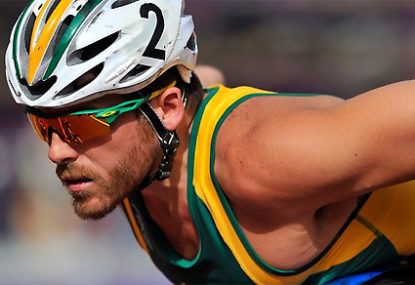'An iconic roster': LeBron, Steph, KD headline all-star cast for Team USA's shot at Olympic glory
LeBron James is going back to the Olympics for the first time in 12 years. Steph Curry is headed to the games for the…

Matthew Cowdrey. Australia’s most successful Paralympian. He’s won numerous gold medals in London, holds countless world records and is a good looking, articulate athlete.
So why did most commercial radio and television stations in our country consider his experiences and achievements down-the-bulletin stories only?
Yes, it was footy finals, but we as a society were constantly connected to anything happening under the four-ringed Olympic flag, however when it came to Cowdrey or the Paralympics more widely, the connection seemed to remain static.
This seemed extremely naive as if I were to think about whom could teach this nation about perseverance, humility and athletic performance, it would be Matt over any twittering know-it-all, anytime. Yet his name was incorrectly pronounced and spelt by Channel 10 in their news update.
So why are many of the decision makers in the media industry shying away from showing us the sporting heroes of Australia in prime-time and in prime spaces?
Is it the assumption that certain parts of their target audiences might find the vision of a legless or armless person too confronting? Is it the secondary timing of the Paralympics which allows it to be seen as minor and second-rate to the major games?
Or perhaps it’s the fact that no matter how hard they push themselves, their bodies will never be the fastest, highest or strongest in the world, and in our quest for perfection we would rather watch (and sponsors would rather pay) the supposed top athletes? It is perhaps time for some realisation and clarity.
James “Commonwealth Bank- Mitsibishi- Samsung-Subway” Magnussen swam the 50m freestyle in 22 seconds. Matt swam it in just 3.11 seconds slower with only one arm. Please justify to me how that is not a superhuman act.
There are also issues surrounding how to contextualise athletes with a disability, as media editors struggle to overcome them being presented as patronising, against the odds, feel good stories, while the Paralympian competitors remain fighting to be regarded for what they are; simply elite athletes.
As someone whose brother has a physical disability I understand that need. However, when I watch the Paralympics I am more impressed how these athletes find ways around their limits using skills that I struggle to comprehend.
So what can Matt and his fellow Paralympians do to improve this? Do they suck it up, clinging onto the idea that ‘any publicity is good publicity’ and train with the intent to get coverage, sponsors and brand themselves as super-freaks?
Or do they keep doing what they are doing and simply wait for the world, the media and its decision makers to catch up on an event that is simply before its time.
The ABC, who did embrace the event, received double the audience for their nightly prime-time and 1.8 million viewers tuned into their day one coverage.
Whereas Channel 10 had its criticised breakfast show and its failing reality show The Shire. Now whose decision seems disabled?